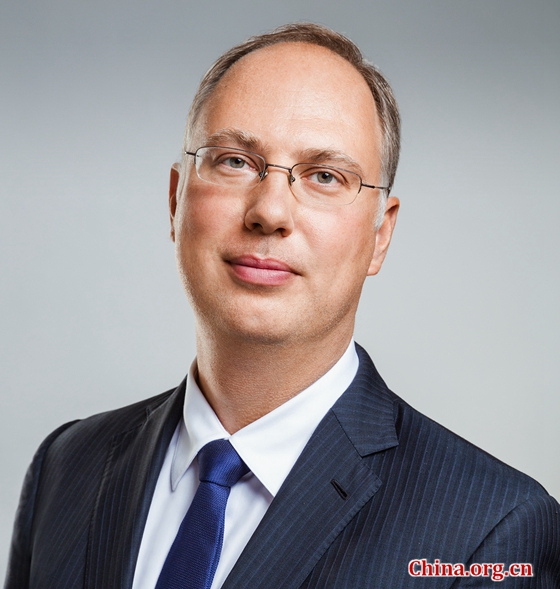RDIF CEO: BRICS needs to enhance intra-group ties
- By Zhang Rui
 0 Comment(s)
0 Comment(s) Print
Print E-mail China.org.cn, September 6, 2017
E-mail China.org.cn, September 6, 2017
 |
|
Kirill Dmitriev, CEO of the Russian Direct Investment Fund (RDIF), speaks to China.org.cn in Xiamen, Fujian Province, Sept. 5, 2017. [Photo/ China.org.cn] |
The top executive of the Russian Direct Investment Fund (RDIF) told China.org.cn on Tuesday in Xiamen, Fujian Province, during the BRICS Summit that intra-BRICS investments are not enough and the current focus is on greater use of the bloc's collective potential and cooperation.
"Unlike other economic blocs and organizations, BRICS economies are not yet closely entwined," said Kirill Dmitriev, chief executive officer of the RDIF. "As individual countries, we are more likely, and willing, to invest in non-BRICS countries rather than in each other's economies. Intra-BRICS investments currently accounts for only about 10 percent of the bloc economies' total foreign direct investment. Therefore, it is very important to continue developing intra-group economic ties."
Prior to becoming CEO of RDIF in 2011, the legendary Kirill Dmitriev headed a number of large private equity funds and completed a series of landmark transactions, including the sale of Delta Bank to General Electric and STS Media to Fidelity Investments among others.
In 2011 he was the only Russian representative on the list of the "100 most influential private equity professionals of the decade" by the Private Equity International magazine.
He is certain that BRICS will be more influential in the future outside the United States bloc realm.
"Any original effort aimed at removing or reducing obstacles, and creating opportunities for joint development, will certainly have a positive effect. The task for us is not to oppose efforts, but to unite them," he said.
Dmitriev revealed to China.org.cn that this time they have also discussed the possibility of introducing cryptocurrency for settlements between the BRICS countries, as they believe that at some point in the future they may substitute traditional currencies. Another key topic discussed during the summit is the need to create an environment conducive of promoting mutual trust and global macroeconomic growth.
"It is extremely important for us that Russia continues to grow its investment appeal for international investors, and to play a key role in the development of international economic relations," he added.
China is already Russia's largest foreign trade partner, and this naturally has a positive impact on the investment cooperation between the two countries. Last year, total foreign direct investment from China to Russian increased by 12 percent.
The executive believed that the interactions of Russia and China within the BRICS summit will be fundamental to developing Russian-Chinese trade and economic relations.
"We need to continue promoting settlements in our national currencies and eliminate the remaining barriers to the free flow of capital between us. It is important that both the Russian and Chinese leadership understand that our current cooperation is mutually beneficial, and promotes further progress and development," he said.
RDIF was founded in June 2011 under the leadership of both then-President Dmitry Medvedev and then-Prime Minister Vladimir Putin as part of a broader initiative to improve the investment climate of Russia and establish Moscow as an international financial center. RDIF and China Investment Corporation (CIC) are co-heading the Entrepreneurship Committee under the Russian-Chinese Intergovernmental Commission for Investment Cooperation, which is currently considering more than 60 projects totaling around US$100 billion. RCIF has already co-invested US$5 billion with its partners and at least an equal amount of investment available for projects currently under development.
The fund has many investment projects in China, such as a hi-tech zone in Xi'an, and a robot center, an online steel trade platform and more, many of which are technology-oriented. The pool of RDIF's Chinese partners is expanding. In addition to CIC, partners include Inventis Investment Holdings, China Development Bank, Silk Road Fund, China-Eurasian Economic Cooperation Fund, Sinomec and others. Dmitriev revealed they are currently considering the construction of a wind power station in Karelia jointly with China’s Fujian Province.
"We note the positive investment dynamic in our projects in China and the high interest in several sectors, especially in technology. This is one of the reasons why the capital of Russia-China Investment Fund (RCIF), established jointly by RDIF and China Investment Corporation, has doubled to US$2 billion," he continued. "We are also considering new opportunities. One such opportunity is establishing a mechanism allowing investments to be settled in national currencies.
During the visit of President Xi Jinping to Moscow this summer, RDIF signed an agreement with China Development Bank to establish the China-Russia RMB Investment Cooperation Fund, which would enable the implementation of direct investments with settlements in national currencies totaling 68 billion yuan (US$10 billion).
As for the possibility of the BRICS free trade zone in the future, Dmitriev said they support initiatives that are designed to have a positive economic impact. "But at the same time, it is important that these initiatives do not hamper development. This year we expect to surpass the US$80 billion mark and the value of trade between Russia and China will soon be US$100 billion. The export of Russian agricultural products to China, a sector gaining in momentum, will play a crucial role in reaching this figure."
He expected that the amicable relationship between Russia and China can be successfully replicated with other BRICS countries. "These partnerships will only grow and strengthen. As such, out of 50 RDIF portfolio companies, more than half are developing business with partners from BRICS countries. Having analyzed RDIF's transactions, we have come to a conclusion that investments in Russia with partners from BRICS will double in value over the next three years," he stated.






Go to Forum >>0 Comment(s)